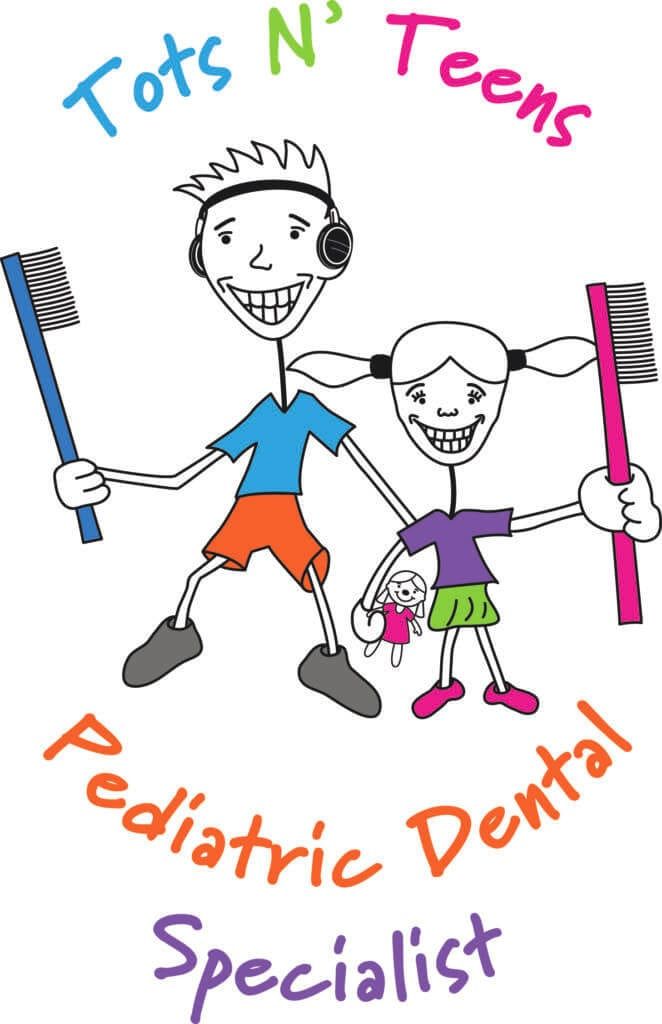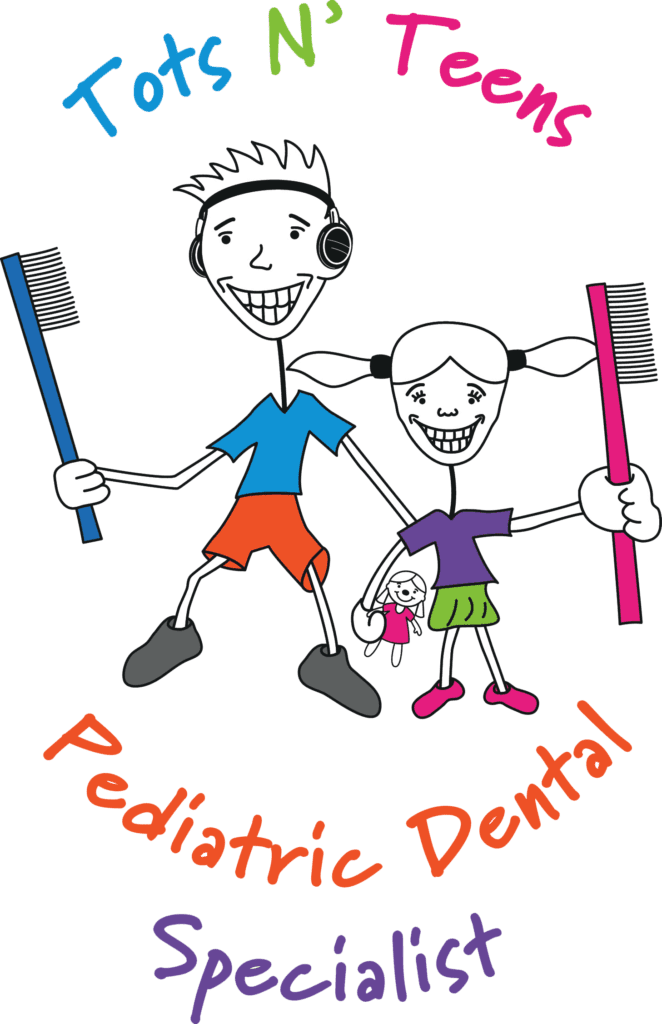After dental school training as a general dentist, a pediatric dentist has to complete 2 more years of residency training to be fully equipped to provide comprehensive dental care to children up to the age of adolescence.
By being an age-specific specialty, a pediatric dentist is better able to:
– provide appropriate behavior guidance based on the personality of your child,
– provide care for medically and developmentally compromised patients,
– anticipate the future “shape” of your child’s dental and facial growth and intervene in a timely manner to correct any anticipated growth discrepancies.
– provide preventive dental care,
– provide sedation , or other pharmacological management that will make -your child’s dental experience comfortable and fun!
Pediatric dentist are trained to treat conditions and diseases unique to growing individuals.
It is recommended that the first dental visit be as soon as your child’s first tooth erupts (at 6-8 months old), and no later than 12 months of age.
Please understand that if your child is older than 12 months, and has never been to a dentist, it’s never too late. Dr Mbibi and her staff are happy to provide a comfortable dental home for you and your child regardless of your child’s past dental history.
Not every child needs dental x-rays. Our office uses low-dose digital x-rays if your child requires x-rays. X-ray recommendations are made based on your child’s age, evaluated risk of getting cavities, stage of dental development, history of dental trauma, or on an “as needed basis” after oral evaluation by Dr Mbibi. These x-ray recommendation are to ensure that the best and most comprehensive dental care is provided to your child.
During most dental treatment, Dr Mbibi allows one parent in the room to be a “Silent Observer”: we ask that you stay silent so that Dr Mbibi and her staff’s attention is fully devoted to your child.
Sometimes, it may be in the best interest of your child that an overly fearful parent not be in the room, as kids can become afraid when they sense fear in their parent. Another instance when parents are not allowed in the treatment room is during General Anesthesia.
Only tooth-colored mercury-free fillings will be used for your child, if fillings are recommended.
Naturally, beneath every primary tooth is a permanent tooth that’s forming as your child grows; the permanent tooth should erupt into the mouth at an age-appropriate time by “pushing” out the primary tooth. Thus, a primary tooth guides each permeant tooth on the proper eruption path.
Children start to lose their anterior baby teeth between 6-8 years old, while their posterior primary teeth are lost between 10-12 years old. When baby teeth are lost too early due to cavities, infection, or trauma, the adjacent teeth could shift into that space preventing the adult tooth from growing into the mouth. This can affect the esthetics of your child, and the proper function of your child’s teeth and jaw.
Children that have cavities report pain and discomfort that affects their school performance and attendance, cause un-restful sleep, and can lead to malnutrition due to inability to eat properly. Rampant cavities is one of the factors that cause insufficient development in children who have no other medical problems (Referenced from the “American Academy of Pediatric Dentistry guidelines”)
We recommend that children participating in active sports wear mouth guards to protect the teeth, gums, and other oral tissues from accidental bruising, injury and/or fracture. A mouth guard works by absorbing and dissipating force at the site of impact.
Our office provides custom-fabricated mouth guards that fits your child perfectly and provides superior comfort, protection and retention. It should be worn while your child is playing sports to protect from sport-related injuries.
– Encourage daily oral hygiene habits at home, that way your child grows up with those habits. Bad habits are difficult to break, and new habits are difficult to maintain when your child becomes older
– Brush your child’s teeth two times a day (in the morning and before bed), until you’re confident your child has developed the manual dexterity to brush his/her teeth on their own.
– Encourage your child to floss at least once a day (before bed)
– Limit frequent snacking and juices between meals
– Visit your Pediatric dentist regularly; receive recommended preventive dental care your child needs
– Use a fluoridated toothpaste as appropriate for your child; Our staff will be happy to discuss this with you.
– Eat a healthy, well balanced diet.
Thumb or pacifier habits usually become a problem if your child continues the habit for a prolong period of time. Usually, most children stop these habits on their own by 3 years old. However, if your child continues thumb or pacifier habit past 3 years of age, it may affect the shape and form of your child’s teeth and jaws. After evaluation, Dr Mbibi may recommend some behavior guidance or appliances to help your child stop sucking his/her thumb or pacifier.
Dental sealants work by covering crevasses in the chewing surface of your child’s teeth, where micro food particles and cavity-causing bacteria can be retained. Sealants prevent cavities from forming on the chewing surface of your child’s teeth.
The first thing to do is remain calm. Pick up the tooth from the crown; avoid grabbing the tooth by it’s root as we want the cells around the tooth to remain vital. Re-insert the tooth back into the gum and call your pediatric dentist. If re-insertion isn’t possible, put the tooth in a cup of milk and call your pediatric dentist.
Teething usually occurs right before your child’s baby teeth erupts. Some baby’s may experience teething as early as 3 months before a primary tooth breaks through the gums.
Your child may be cranky or more irritable during this time, and may keep his/her mouth open to avoid biting on the sore gums; this may cause your child to drool more than usual. A rash may develop around your child’s mouth, chin and chest area due to the drooling. These mild symptoms are nothing to be overtly concerned about.
Also, you may notice that your child wants to nibble on objects, and fingers. This nibbling is usually soothing for babies. Dr Mbibi recommends that you let your baby nibble on safe objects, preferably a teething ring. Teething rings can be placed in the fridge before giving it to your baby; many babies find the cold-ring soothing.
You can also apply “homeopathic” baby-orajel to your child’s gums.
Dr Mbibi recommends that you stay away from orajel that contain topical anesthetics like “benzocaine” or any active ingredient ending in “…caine”; such topical anesthetics can possibly cause Methemoglobinemia in babies, a condition that reduces the oxygen-carrying content of the blood.
Also avoid giving your child aspirin, as aspirin in children has been associated with Reyes-Syndrome: a fatal syndrome that can have detrimental effects on many organs.
The American Board of Pediatric Dentistry recommends you schedule your child’s first dental visit after the first teeth erupts, thus setting your child up for a lifetime of a healthy smile!
Primary teeth starts to form at about the 14th week of pregnancy. The first primary teeth usually grows into the mouth 6-8 months after the birth of your baby. Usually, the two lower front teeth (mandibular central incisors) grows-in first, then the two upper front teeth (maxillary central incisors) will be next. Your child will continue to get more teeth until he/she has 20 primary teeth in total – usually at about 2.5 years of age.
Please understand that this timeline is an average. Your child might get teeth sooner or later than this timeline, and that may be very normal for your child.
Your child’s first permanent molar starts to form at birth. The two lower front teeth usually grow into the mouth first, at about 5.5-6 years of age.
Once the lower front teeth have grown in, it’s expected that the first permanent lower molars are either erupted or soon to erupt: during this time, your child may complain of soreness or discomfort when chewing. If this discomfort affects your child’s quality of life, please stop by our office to have it evaluated; palliative treatment would be provided or recommended.
Ideally, all primary teeth will be replaced by permanent teeth by 11-12 years old. At this age, your child should have 28 permanent teeth. If your child’s wisdom teeth is formed and erupts normally, your child will have 32 permanent teeth.
Wisdom teeth are the last teeth to form and the last teeth to grow into the mouth at about 16 years of age. It’s size and shape are variable and in some individuals, wisdom teeth never form. Because it’s the last teeth to grow into mouth, there might not be enough space for these teeth to fit in the mouth; thus they are the most common teeth to be impacted and may need to be extracted.
Dr Mbibi will evaluate and monitor the formation, growth and position of your child’s wisdom teeth; if needed, Dr Mbibi will recommend an appropriate time to extract these teeth and prevent future problems that these teeth can cause if not extracted timely.

